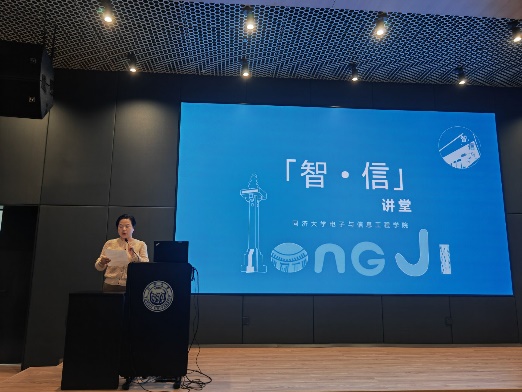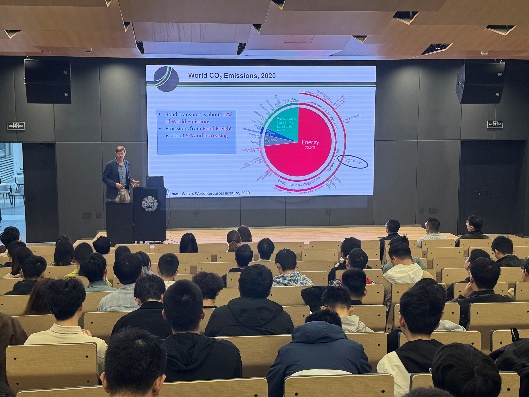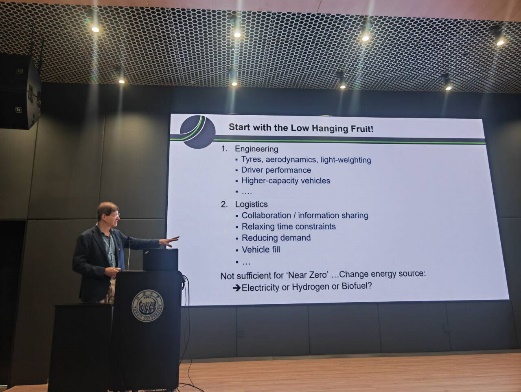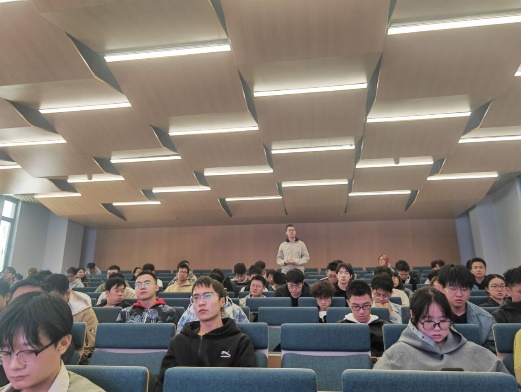On October24, 2025, the83th Zhi Xin Forumwas held in Lecture Hall117atthe Zhixin Building, which was jointly organized by the College of Electronic and Information Engineering and Shanghai Institute of Intelligent Science and Technologyof Tongji University.Prof. David Cebon from the University of Cambridge was invitedto deliver a speech on “Challenges in Decarbonisation of Road Freight”.

First, Prof. David Cebon opened his speech by clarifying the industry positioning of long-haul road freight——as a core link in the global economic supply chain, it accounts for a significant proportion of energy consumption and carbon emissions. However, due to constraints from technical characteristics and operational scenarios, it has become a key sector that is “difficult to decarbonise” in the field of transportation. He further analyzed the technical pain points: heavy-duty trucks need to continuously output high power to ensure long-haul transportation efficiency, while the current mainstream battery electric technology has bottlenecks in driving range, fast energy replenishment capability, and load adaptability, making it difficult to meet the actual needs of long-haul freight. Thus, there is an urgent need to explore more suitable decarbonisation pathways.

Then, Prof. Cebon focused on in-depth analysis of two core alternative technology solutions. The first is hydrogen fuel cell electric trucks. He pointed out that this technology has innate potential in long-haul scenarios due to its advantages of long driving range and short energy replenishment time, but at the same time, it faces practical challenges such as high cost of green electricity-based hydrogen fuel production, high difficulty in hydrogen storage and transportation, and sparse layout of hydrogen refueling station infrastructure. The second is dynamic charging technology. This solution draws on the power supply logic of electric trains and trams, and replenishes electricity in real time for moving trucks through inductive coils embedded under roads or overhead wire networks. It can fundamentally solve the battery capacity limitation issue, and its energy conversion efficiency is significantly higher than that of traditional charging modes. However, it requires targeted transformation of existing road infrastructure, involving planning coordination and preliminary investment. Later, Prof. Cebon conducted a multi-dimensional comparison of the comprehensive performance of the two technologies based on his team’s long-term research data. Through quantitative analysis, he demonstrated that dynamic charging technology is more competitive in long-haul freight scenarios.

After thereport, Prof. Cebon had a cordial exchange and discussion with the participating teachers and students, and he also encouraged them to actively broaden their horizons, explore, discover and solve new scientific problems based on his own experience. Thisreportfurther expanded the vision of our teachers and students and enhanced their understanding andknowledgeof the technology routes and core challenges in the decarbonisation of long-haul road freight.
